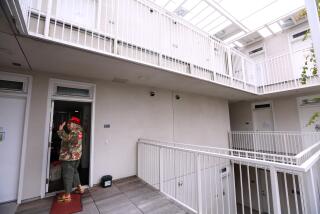Sales Tax Bill Benefits Firms That Overpay
SACRAMENTO â With tax D-day barely a fortnight away, and the governmentâs outstretched hand on nearly everyoneâs mind, what better time to expose a basic unfairness in the state tax code?
Such reasoning was in the air at the Capitol on Thursday as two Assembly members unveiled a bill (AB 1189) to correct a tax law inequity that penalizes business taxpayers.
Assemblymen Nao Takasugi (R-Oxnard) and Jim Morrissey (R-Santa Ana) are trying to straighten out this problem: When businesses are late in submitting state taxes, they are charged 11% interest. The state, on the other hand, pays only 4% interest when it returns overpaid taxes to businesses.
âThis puts taxpayers at a huge, huge disadvantage,â Takasugi said. âThis is just one more jab by the government that infuriates taxpayers.â
Thanks to a law that went into effect in January, individuals need not worry about such a dig, said State Board of Equalization spokesman Richard Ledford. They pay--and are paid by the state--8% interest on overdue amounts.
But retail stores, manufacturing outlets and the mom-and-pop outfits that are the bread and butter of many communities are subject to the lopsided formula.
âWeâre talking about businesses where the man and woman go home at night to balance their checkbooks at their kitchen table,â said Takasugi, a former grocer.
Any business that collects sales tax and turns it over to the state on a quarterly basis is affected--nearly 1 million California businesses in all.
The proposed law would even the playing field by raising the interest rate to 11% for both parties, the legislators said.
âThe lower interest rates taxpayers now receive when they overpay on their taxes is, in reality, just a higher tax,â Morrissey said.
Takasugi said he is sure the measure stands a good chance in the Legislature. He speculated that Gov. Pete Wilson might view it favorably because the idea fits with the Administrationâs business recovery agenda.
As for the Administrationâs concern that there continue to be an incentive to pay taxes on time, Ledford cited an additional 10% penalty that late taxpayers are assessed on top of the 11% interest.
If signed into law, the bill would reduce state revenue by about $5 million a year. Takasugi downplayed worries of its cost to the state, contending that state government has benefited unfairly from the formula since it was enacted in 1991.
Beyond the fairness issue lies the need to create a favorable climate for commerce, said David Doerr of the California Taxpayers Assn., a supporter of the measure.
With the current policy, âWe send the wrong kind of signal about doing business in California,â Doerr said. âIt doesnât make any sense.â
The bill is part of a package of tax reform the association backs and Takasugi will attempt to shepherd as vice chairman of the Assembly Revenue and Taxation Committee.
The original proposal for the bill came from the tax-collecting State Board of Equalization, which set out to unearth problems and correct them, Ledford said. âYou wonât find too many tax agencies that are willing to look at themselves and say whatâs fair and whatâs not,â he said.
And all who gathered at Thursdayâs news conference agreed that there is no better season for shining a light on tax inequities.
âThis is the one time of year we can get attention on tax issues,â said Julia King, a Takasugi aide.
More to Read
Inside the business of entertainment
The Wide Shot brings you news, analysis and insights on everything from streaming wars to production â and what it all means for the future.
You may occasionally receive promotional content from the Los Angeles Times.










